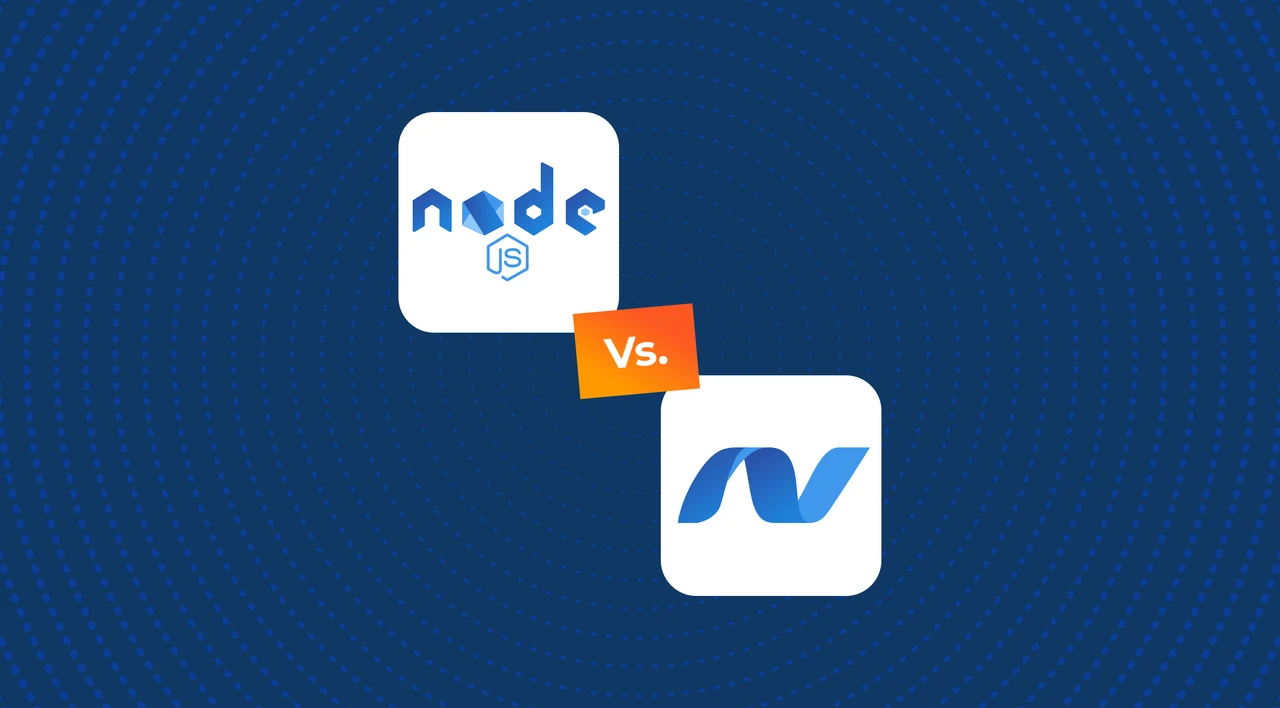SHARE
Node.js vs. ASP.NET: Which is Better in 2025?

Contents
Contents
If you worry about choosing between Node.js and ASP.NET this 2024, you must be an informed developer.
Node.js and ASP.NET are powerful web development frameworks but have some key differences.
The choice between Node.js and ASP.NET will depend on the specific needs of your project. It will also depend on the professionalism of your development team.
We will help you make an informed decision on which of the two frameworks best suits your needs. Read on to find out!

What is Node.js?
Node.js is an open-source, cross-platform JavaScript runtime environment that allows developers to build scalable network applications.
The framework uses an event-driven, non-blocking I/O model. This model makes Node.js well-suited for building real-time, data-intensive applications.
What is Node.js used for?
Node.js is primarily used for server-side web development but can also be used for building command-line tools and desktop applications.
Developers can use JavaScript to write both client-side and server-side code. This makes Node.js a popular choice for full-stack web development.
Below are some of the features and uses of Node.js.
Scalability
Node.js is known for its ability to handle large amounts of traffic and scale easily.
It uses a single-threaded event loop to handle requests, which means it can handle thousands of concurrent connections without creating a new thread for each request.
Real-time applications
The JavaScript framework is well-suited for building real-time, data-intensive applications like chat apps, online gaming platforms, and streaming services.
In addition, Node enables developers to build web servers using the HTTP module.
Command-line tools
Node.js can be used to build command-line tools and scripts, making it a popular choice for automating tasks and building dev tools.
Desktop applications
With the help of frameworks like Electron, developers can use Node.js to build cross-platform desktop applications using web technologies such as HTML, CSS, and JavaScript.
Popular Node.js Web Frameworks
Wondering which are the best Node.js frameworks on the market? Here they are:
Express.js
This minimalist web framework provides robust features for building data-driven web applications.
Express also allows developers to build mobile applications. Users can easily render an html page using Express.
Koa.js
Koa is a lightweight framework that uses modern JavaScript features to make building web applications more enjoyable.
Meteor.js
It is a full-stack framework that allows developers to build real-time web and mobile applications using a single codebase.
Nest.js
Nest is a progressive Node.js framework for building efficient, reliable, and scalable server-side applications.
Hapi.js
It is a powerful, configuration-centric framework for building web applications and APIs.
What is ASP.NET?
ASP.NET is one of the many Microsoft products. If you solely trust Microsoft products, then it’s your go-to web framework.
ASP.NET is primarily used to build web applications using .NET languages such as C# and Visual Basic.
It is part of the larger .NET framework and provides a wide range of features and tools for building modern web applications.
What is ASP.NET Used For?
ASP.NET is primarily used for server-side web development. It supports various programming models, including MVC (Model-View-Controller), Web API, and Web Forms.
It also includes support for authentication, caching, session management, and other common web development tasks.
Below are some key features of ASP.NET which inform its uses.
Scalability
ASP.NET is designed to handle large amounts of traffic and can scale easily with the addition of more resources.
Security
ASP.NET includes built-in security features such as authentication and authorization and support for SSL/TLS encryption.
Integration
ASP.NET integrates seamlessly with other Microsoft technologies such as Azure, SQL Server, and Visual Studio.
Extensibility
ASP.NET supports various third-party libraries and tools, allowing developers to extend its functionality and customize their applications.
What is the Difference Between .NET and .NET Core?
.NET and .NET Core are web frameworks developed by Microsoft for building Windows applications.
.NET is a comprehensive framework that is primarily used for Windows-based development.
.NET Core is a modern, cross-platform framework that is optimized for cloud-based development and microservices architecture.
.NET is a mature, full-featured framework that has been around for many years and is widely used for building Windows desktop applications, web applications, and services.
It is a closed-source framework that requires Windows as the operating system.
.NET Core, on the other hand, is an open-source, cross-platform framework that is designed to be lightweight and modular.
It supports building web applications, services, and command-line tools and can run on Windows, Linux, and macOS.
.NET Core is also optimized for containerization and microservices architecture.
Advantages of Node.js over ASP.NET
Here are the competitive advantages you will have over ASP.NET if you choose to go with Node.js:
Better performance
Node.js is known for its high-performance capabilities and non-blocking I/O model, making it ideal for building real-time, data-intensive applications.
Lightweight and scalable
Node.js is a lightweight framework that can handle thousands of concurrent connections without creating a new thread for each request, making it well-suited for building scalable applications.
Large community and module ecosystem
Node.js has a large and active community of developers, and thousands of open-source modules can be easily integrated into Node.js applications.
Full-stack development with JavaScript
With Node.js, developers can use JavaScript on both the server and client sides, making it a popular choice for full-stack web development.
Cross-platform support
Node.js applications can be easily deployed across multiple platforms, including Windows, Linux, and macOS.
Advantages of ASP.NET over Node.js
Here are the benefits you will enjoy from working with Node.js instead of ASP.NET:
Better Integration with Microsoft Technologies
ASP.NET integrates seamlessly with other Microsoft technologies such as Azure, SQL Server, and Visual Studio.
The integration makes it an ideal choice for building Windows-based applications and services.
Robust Security Features
ASP.NET includes built-in security features such as authentication and authorization and support for SSL/TLS encryption, making it a secure choice for building web applications.
Easy to Learn and Use
ASP.NET is a mature framework that has been around for many years, and many resources are available for learning and using it.
Strong Typing and Compile-Time Checking
ASP.NET is a statically typed language that provides compile-time checking, making it easier to catch errors and ensure code quality.
Wide Range of Development Tools
ASP.NET includes a wide range of development tools and features, including Visual Studio and the .NET Framework, making it easy to develop and debug applications.
Node.js vs. ASP.NET Comparison
Programming Language – C# vs. JavaScript
Node.js is based on JavaScript, which is a popular and widely-used programming language. ASP.NET, on the other hand, uses C# and other .NET languages.
Both JavaScript and C# have their own strengths and weaknesses, and the choice between them largely depends on the project’s specific needs and the development team’s skills.
Learning Curve
Node.js has a relatively low learning curve, especially for developers already familiar with JavaScript.
ASP.NET has a steeper learning curve, particularly for developers unfamiliar with the .NET ecosystem.
However, both frameworks have extensive documentation and resources available for developers to learn and master them.
Stability
Node.js and ASP.NET are stable and reliable frameworks used to build many high-traffic, mission-critical applications.
However, Node.js is known for its event-driven, non-blocking I/O model, which can help improve the performance and scalability of applications.
Community Support
Node.js has a large and active community of developers, with thousands of open-source modules available for use in Node.js applications.
The Node.js community is also known for its focus on innovation and experimentation.
ASP.NET also has a strong community of developers but may be more focused on enterprise-level development.
The ASP.NET community of developers may, however, not have the same level of innovation and experimentation as the Node.js community.
Popularity
Both Node.js and ASP.NET are popular frameworks for building web applications and services.
Node.js is particularly popular for building real-time, data-intensive applications, while ASP.NET is often used for enterprise-level development.
However, Node.js has been growing in popularity in recent years, particularly in the startup and technology communities.
Node.js vs. ASP.NET: Which is Better?
If high performance, scalability, and a large community of developers are important considerations, Node.js may be the better choice.
On the other hand, if integration with Microsoft technologies, built-in security features, and a wide range of development tools are important, ASP.NET may be the better choice.
Keep in mind that both frameworks have their strengths and weaknesses, which we have highlighted in the article. Use them to decide which framework works best for you.
Summary
As described in the article, Node.js is known for its high-performance capabilities, lightweight and scalable framework, large community, and cross-platform support.
ASP.NET, on the other hand, ASP.NET integrates well with Microsoft technologies, has built-in security features, and a wide range of development tools.
Regarding programming language, Node.js uses JavaScript, a popular and widely-used language, while ASP.NET uses C# and other .NET languages.
Both frameworks have a stable and reliable track record, with Node.js being particularly well-suited for building real-time, data-intensive applications.
ASP.NET developers use the framework for enterprise-level development. Whether you choose Node.js or ASP.NET, you can still build reliable web applications for your clients.
Frequently Asked Questions
What is the node package manager (NPM)?
The Node Package Manager (NPM) is a package manager for the JavaScript programming language.
It is the default package manager for Node.js and manages dependencies for Node.js projects.
With NPM, developers can easily download and manage packages and modules used in their Node.js applications.
What alternatives are there to Node.js and ASP.NET?
There are many alternatives to Node.js and ASP.NET for building web applications and services.
Some popular alternatives to Node.js include Python’s Django, Ruby on Rails, and Java’s Spring Framework.
Some popular alternatives to ASP.NET include PHP’s Laravel, Python’s Flask, and Ruby’s Sinatra.
How do you learn Node.js development?
Many resources are available for learning Node.js development, including online tutorials, courses, and documentation.
Some popular resources for learning Node.js development include:
- The official Node.js documentation
- The Node.js Foundation
- Online learning platforms such as Udemy, Pluralsight, and Coursera.
What is a backend web framework?
A backend web framework is a software framework used to build web applications’ server side.
It provides developers with tools and libraries for building the backend logic of web applications, such as handling requests, processing data, and interacting with databases.
Examples of backend web frameworks include:
- Node.js
- ASP.NET
- Ruby on Rails
- Django
Professional Node.js Development Services
Flatirons offers top-rated Node.js development services.
Get the CEO's Take
Handpicked tech insights and trends from our CEO.
Professional Node.js Development Services
Flatirons offers top-rated Node.js development services.
Get the CEO's Take
Handpicked tech insights and trends from our CEO.

Record Information System (RIS) for Healthcare Data Management
Flatirons
Jul 02, 2025
Proof of Concept Examples: Validating Ideas in Action
Flatirons
Jun 30, 2025
Javascript Developer Salary Insights in the US
Flatirons
Jun 28, 2025
Powerful Electron Alternatives for Cross-Platform App Development
Flatirons
Jun 28, 2025
Why Is Python So Popular – Explained for Beginners
Flatirons
Jun 28, 2025
What is a White Label App?
Flatirons
Jun 28, 2025